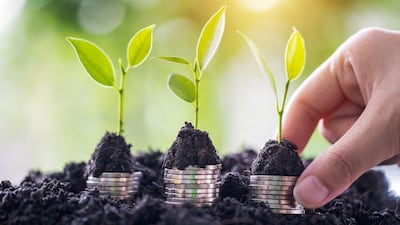Mobilising just 1 per cent of the world's $230 trillion to $400tn of household wealth annually would help to bridge the $2.5tn investment gap needed to achieve the UN's Sustainable Development Goals, according to a new report by Swiss bank UBS.
"Environmental and social issues impact our broader economy, corporate financial performance, consumer behaviour and future state of our planet," said Solita Marcelli, chief investment officer of the Americas at UBS Global Wealth Management and co-author of the Future of Earth report.
“Not considering these issues means not fulfilling our duties to consider all the relevant drivers of investor portfolios.”
The Covid-19 pandemic has served as a wake-up call to many stakeholders about the importance of environmental, social and governance factors. Global assets focused on ESG criteria are on track to exceed $53tn by 2025, according to a Bloomberg Intelligence report.
The pandemic also accelerated impact investments to more than $700bn last year from $500bn in 2019, a report by the Global Impact Investing Network said.
Although the world has made massive strides in improving quality of life and roughly doubled life expectancy in the past century, this progress has come at an environmental cost, Ms Marcelli said.
The financial toll of 22 natural disaster events in the US last year cost more than $1 billion each, marking a new annual record and double the number recorded in 2019, she added.
Natural disasters caused an economic loss of $268bn globally in 2020, according to insurance company Aon.
“One of the positive outcomes of the Covid-19 pandemic has been the recognition by both governments and companies that our economies need to be rebuilt in a more sustainable manner,” Ms Marcelli said.
Recent examples include the European Union's €1.85tn stimulus package dedicated to climate investment, which was rolled out last year, President Joe Biden's “favourable policies” to encourage investment in green infrastructure projects in the US, and China and Japan’s plans to achieve carbon neutrality by the middle of this century, Ms Marcelli said.
“There is growing recognition that environmental factors can materially impact fundamentals, valuations and long-term returns. Investors are increasingly expressing their desire to incorporate ESG considerations into their financial goals,” she said.
With energy-related emissions accounting for more than two-thirds of global greenhouse gas emissions, the UBS report said the world's reliance on fossil fuels had to end. However, a complete transition to clean fuels will take decades, it added.
Retail investors could find opportunities in companies whose products and services directly address the transition to a low-carbon economy, or those that manage their carbon footprint effectively, Andrew Lee, head of sustainable and impact investing at UBS, said.
“Investment opportunities abound, particularly in the renewables sector in emerging technologies such as hydrogen, fuel cells, batteries, biofuels, carbon capture and storage; energy storage and logistics; and energy efficiency," Mr Lee said.
"Within private markets, renewable infrastructure development, including large-scale wind and solar farms as well as off-grid electricity networks, provide investment opportunities.”
Investors can consider smart agriculture technologies, such as vertical farming and robotic large-scale greenhouses, which help to make traditional farming more efficient and less resource-intensive.
Other investment options include sustainable production and consumption practices, Laura Kane, head of thematic investing for the Americas at UBS, said. “There is growing appetite for plant-based meat, alternative proteins and lab-grown meat,” she said.
There is also investment potential in urban planning solutions and smart city technologies, as well as in companies that address employees’ working conditions and their exposure to physical climate risks. Treatments for illnesses linked to climate change, including drugs and medical devices, are also options, Ms Kane added.


